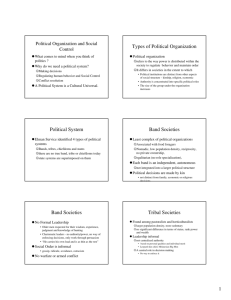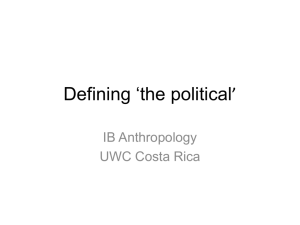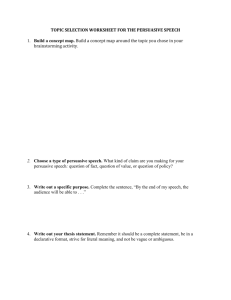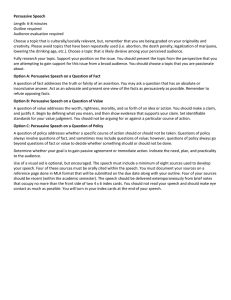Chapter 7 - Baker Publishing Group
advertisement
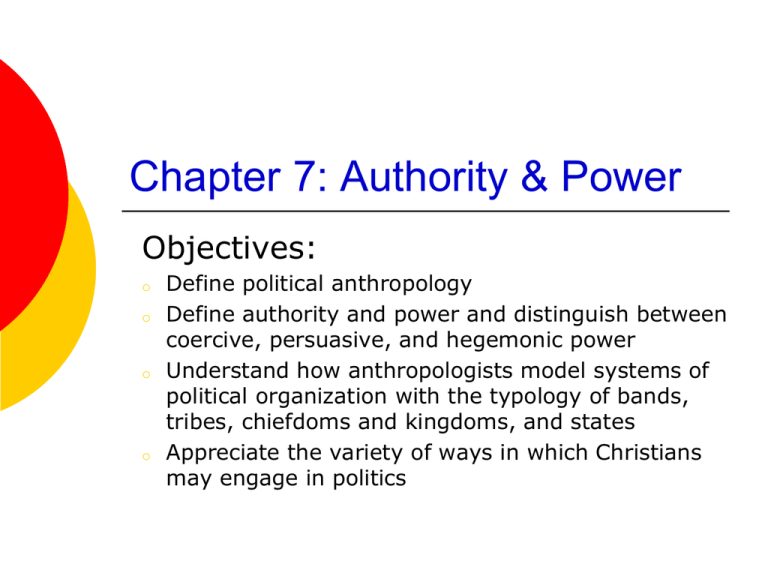
Chapter 7: Authority & Power Objectives: o o o o Define political anthropology Define authority and power and distinguish between coercive, persuasive, and hegemonic power Understand how anthropologists model systems of political organization with the typology of bands, tribes, chiefdoms and kingdoms, and states Appreciate the variety of ways in which Christians may engage in politics Power and Culture Power: influence or control over the behavior of others Authority: the right granted to exercise power Three categories of power: coercive, hegemonic, and persuasive Coercive Power Hegemonic Persuasive Power and Culture Coercive Power The use of force—legitimate or illegitimate—by individuals or groups What makes the use of coercive power legitimate or illegitimate is whether the individual or group has the authority to use that power. Power and Culture Persuasive Power The use of words, relationships, and actions that influence others Unlike coercive power, persuasive power can strengthen relationships. Power and Culture Hegemonic Power The dominance of ideas or culture such that imbalances of power or other inequalities are maintained Most powerful force for social control Requires support from widely shared cultural beliefs Power and Culture Power in Action It is helpful to conceptualize power as three discrete types, but in practice all three types act simultaneously. Coercive and persuasive power can be enacted formally or informally, through official organizations or by any individual or group. In practice, coercive and persuasive power usually require the willing cooperation of others. Power and Culture Power in Action(continued) Social sanctions: the responses, positive and negative, that people receive for their behavior Formal sanctions: social sanctions that are approved or delivered by institutions holding official power Formal negative sanctions: fines or punishments meted out for breaking of an official rule Formal positive sanctions: official rewards for socially desirable behavior Informal sanctions: positive or negative actions or words intended to shape behavior that are not approved or delivered by an official organization Political Organization Power and authority are configured in a variety of ways as political systems that guide entire societies. There are types of political organization: bands, tribes, chiefdoms and kingdoms, and states. Today no bands, tribes, chiefdoms, or kingdoms exist apart from the influence of states. Political Organization Bands Up to a few hundred people; most members are held together by kinship, but membership is flexible Leadership is temporary and informal Egalitarianism in division of labor, authority, and decision making Highly effective at avoiding and resolving conflict; conflict resolution done mostly through informal sanctions Political Organization Tribes A decentralized political system that may be associated with any economic form Leadership decided on the basis of unique personal qualities Different tribes may share cultural or linguistic traditions and thus may sometimes create regional associations Organization in and between tribes is based on kinship or age-set systems Conflict resolution is informal but requires a third party negotiator Political Organization Chiefdoms/Kingdoms Political power is centralized. Leadership is an inheritable office, often passed through a family line. Power adheres to the occupant of the office rather than being a product of his or her individual gifts, abilities, or qualities. Community is organized hierarchically according to social status; the power and status of families and individuals depends on their relational distance from the central leader. Political Organization Chiefdoms/Kingdoms (continued) Ability to consolidate control through coercive measures Interpersonal conflicts handled through informal sanctions Rules developed and delivered by chiefs or kings who regulate interactions between groups of higher and lower status, which serves to reinforce social stratification Breach in rules brings punishment or reconciliation on the basis of the sole decision of the ruler. Conflicts escalate into war at a higher frequency than in tribes or bands. Political Organization State Highly centralized form of political organization authority rests in institutions and offices real locus of power is in the office rather than in the individual The distinction of the state is in ideology and culture Developed the concept of bounded nations Christians and Politics The Bible does not favor one political system over another. Prevents the ethnocentrism regarding the superiority of the state system Christians should both engage and critique political systems. Obey and follow political organizations in ways faithful to God’s word Challenge and reject parts of political organizations that do not bring glory to God
